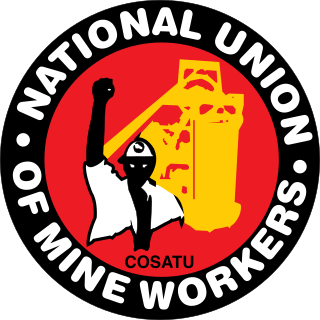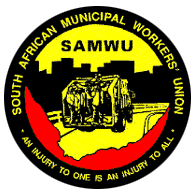Related Research Articles

The Congress of South African Trade Unions is a trade union federation in South Africa. It was founded in 1985 and is the largest of the country's three main trade union federations, with 21 affiliated trade unions.
The International Federation of Chemical, Energy, Mine and General Workers' Unions (ICEM) was a global union federation of trade unions. As of November 2007, ICEM represented 467 industrial trade unions in 132 countries, claiming a membership of over 20 million workers.
The POA: The Professional Trades Union for Prison, Correctional and Secure Psychiatric Workers, also known as the Prison Officers' Association (POA), is a trade union in the United Kingdom. It currently has a membership over 30,000.

The National Union of Mineworkers (NUM) is a mainly mining industry related trade union, an organisation of workers with common goals through organised labour, in South Africa. With a membership of 300,000 as of 2014, it is the largest affiliate of the Congress of South African Trade Unions (COSATU).

The South African Municipal Workers Union (SAMWU) is the largest union in local government in South Africa.

SASBO – The Finance Union is a trade union in South Africa. It was founded in 1916 and has a membership of 70,000.
Trade unions in South Africa has a history dating back to the 1880s. From the beginning unions could be viewed as a reflection of the racial disunity of the country, with the earliest unions being predominantly for white workers. Through the turbulent years of 1948–1991 trade unions played an important part in developing political and economic resistance, and eventually were one of the driving forces in realising the transition to an inclusive democratic government.

Geraldine Joslyn Fraser-Moleketi is a South African politician who was the Minister of Public Service and Administration from June 1999 to September 2008. Before that, from July 1996 to June 1999, she was Minister of Welfare and Population Development. She represented the African National Congress (ANC) in the National Assembly from 1994 to 2008 and is a former deputy chairperson of the South African Communist Party (SACP).
Trade unions in Ghana first emerged in the 1920s and played an important role in the country's economy and politics ever since.

Internal resistance to apartheid in South Africa originated from several independent sectors of South African society and took forms ranging from social movements and passive resistance to guerrilla warfare. Mass action against the ruling National Party (NP) government, coupled with South Africa's growing international isolation and economic sanctions, were instrumental in leading to negotiations to end apartheid, which began formally in 1990 and ended with South Africa's first multiracial elections under a universal franchise in 1994.
The SouthAfrican Mine Workers' Strike was a labour dispute involving mine workers of Witwatersrand in South Africa. It started on 12 August, 1946 and lasted approximately a week. The strike was attacked by police and over the week, at least 1,248 workers were wounded and at least 9 killed.
The 1928 South Indian railway strike was a general strike by the South Indian Railway Workers Union against plans of the South Indian Railway Company to lay off over 3,100 workers in order to reduce the expenditures of the company. The strike lasted from 29 June – 2 August 1928, and severely affected the transportation of people and goods across South India. The Madras government and the South Indian Railway Company responded with a crackdown. Most of the leaders of the strike were arrested and recognition to the union was withdrawn. The Government of Madras recorded it as the "most important event of the year".

The Irish Congress of Trade Unions, formed in 1959 by the merger of the Irish Trades Union Congress and the Congress of Irish Unions, is a national trade union centre, the umbrella organisation to which trade unions in both the Republic of Ireland and Northern Ireland affiliate.

The Trades Union Congress (TUC) is a national trade union centre, a federation of trade unions in England and Wales, representing the majority of trade unions. There are 48 affiliated unions, with a total of about 5.5 million members.. Paul Nowak is the TUC's current General Secretary, serving from January 2023.

The Workers and Socialist Party (WASP) is a Marxist and Trotskyist political party in South Africa affiliated to International Socialist Alternative.
On 15 November 2014 workers at South Africa's major platinum producers – Anglo American Platinum, Impala Platinum, and Lonmin – went on strike demanding that wages be immediately doubled. However, after five months of striking they settled for a more modest pay increase spread over three years. It was the longest and most expensive strike in South African history.
Die Spoorbond was an Afrikaner railway trade-union formed in 1934 by H. J. Klopper, founder of the Afrikaner Broederbond, which advocated a policy of replacing all black railway-workers with Afrikaners. It rejected strikes and called instead for loyal service to the South African Railways and Harbours Administration (SARHA). The union had a membership of some 16,000 in the 1930s, considerably more than that of its rival, the National Union of Railway and Harbour Servants, which was forced to dissolve in 1937.
The South African Railways and Harbours Union was formed by black workers of the South African Railways and Harbours Administration after they had been expelled from the National Union of Railway and Harbour Servants.
The Council of Non-European Trade Unions (CNETU) was a national trade union federation bringing together unions representing black African workers in South Africa.
The South African Congress of Trade Unions (SACTU) was a national trade union federation in South Africa.
References
- ↑ "Strike escalates in South Africa". BBC. 14 June 2007. Archived from the original on 16 June 2007. Retrieved 13 June 2007.